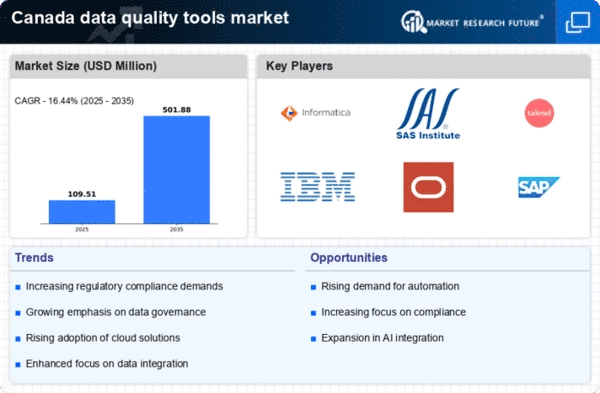Rising Demand for Data Accuracy
The data quality-tool market in Canada experiences a notable surge in demand for enhanced data accuracy. Organizations across various sectors are increasingly recognizing the critical importance of reliable data for decision-making processes. This trend is driven by the need to mitigate risks associated with inaccurate data, which can lead to financial losses and reputational damage. In 2025, it is estimated that approximately 30% of Canadian businesses will prioritize investments in data quality tools to ensure data integrity. This growing emphasis on data accuracy is likely to propel the data quality-tool market forward, as companies seek solutions that can effectively cleanse, validate, and enrich their data assets.
Growth of Data-Driven Decision Making
The data quality-tool market in Canada is witnessing growth fueled by the increasing reliance on data-driven decision-making. As organizations strive to leverage data analytics for strategic insights, the quality of the underlying data becomes paramount. In 2025, it is anticipated that over 50% of Canadian companies will implement data quality tools to enhance their analytical capabilities. This shift towards data-driven strategies necessitates the use of tools that can ensure data accuracy and consistency, thereby fostering trust in analytical outcomes. Consequently, the demand for data quality solutions is likely to expand, as businesses recognize the value of high-quality data in driving competitive advantage.
Increased Focus on Customer Experience
The data quality-tool market in Canada is increasingly influenced by the heightened focus on customer experience. Organizations are realizing that high-quality data is essential for understanding customer preferences and behaviors. In 2025, it is projected that around 35% of Canadian companies will invest in data quality tools to enhance their customer relationship management (CRM) systems. This investment is driven by the need to deliver personalized experiences and improve customer satisfaction. As businesses strive to create more meaningful interactions with their customers, the demand for data quality solutions that can provide accurate and timely insights is likely to grow, thereby supporting the expansion of the data quality-tool market.
Regulatory Pressures and Compliance Needs
The data quality-tool market in Canada is significantly influenced by regulatory pressures and compliance requirements. With the introduction of stringent data protection laws, such as the Personal Information Protection and Electronic Documents Act (PIPEDA), organizations are compelled to adopt robust data quality measures. In 2025, it is projected that around 40% of Canadian enterprises will invest in data quality tools to ensure compliance with these regulations. This trend underscores the necessity for businesses to maintain high standards of data quality, thereby driving growth in the data quality-tool market. Companies are increasingly aware that non-compliance can result in hefty fines and legal repercussions, further motivating their investment in data quality solutions.
Technological Advancements in Data Management
The data quality-tool market in Canada is being propelled by rapid technological advancements in data management. Innovations such as artificial intelligence (AI) and machine learning (ML) are transforming how organizations approach data quality. These technologies enable automated data cleansing, anomaly detection, and predictive analytics, which are essential for maintaining high data quality standards. In 2025, it is expected that approximately 25% of Canadian businesses will adopt AI-driven data quality tools, reflecting a shift towards more sophisticated data management practices. This trend indicates a growing recognition of the importance of integrating advanced technologies into data quality strategies, thereby enhancing the overall effectiveness of data quality tools in the market.
















